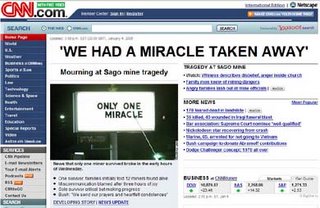Americans are often very quick to throw around words like “God”, “prayers” and “miracles” but more often than not, those words are just easy emotional responses and they are disconnected from their true meaning.

It has shamefully underlined the preposterous paradox of using the word ‘miracle’ - one minute God has done a miracle and the next… well, … He does not seem to care any more… or does He even exist? But if the miners had survived, this would have been just another uncontroversial use of ‘Godly words’.
The problem is that ‘God’ has become a label that is very easy to invoke in American culture. Christianity has been transformed from a personal faith into a National cultural Myth. The trivialization of biblical words like ‘miracle’ is something that should anger everyone but especially people of faith. By ‘trivialization’ I do not mean those people who use expressions like ‘miracles’ as a figure of speech, I mean those people who use it seriously and who literally believe that whatever they experience is God’s (or Satan’s) direct intervention.
The arrogance is conveyed by the underlying assurance that OUR will or desire is GOD’s will or desire. In many ways, it also reflects people’s hunger for the mysterious and the uncanny as if the wonders that cannot be explained would have to automatically fall into the category of ‘miracles’. It is like ‘magic’ and that is not Christian but pagan.
It is understandable that the people of small Appalachian Tallmansville in West Virginia should turn to God at a time of emotional distress. It is another thing for the media to mention the word ‘miracle’, ‘god’ or ‘prayers’ even if the men had survived.
What message does it send to the men who are not saved? What does it say about everybody else who has not experienced such ‘miracle’?
If the people of Tallmansville feel that they “have had a miracle and that it was taken away from them” and if they “don’t even know if there is a God any more”, it is because they have been given false expectations – not only with regard to the surviving of the men, but also with regard to God’s intervention and what constitutes a miracle. The problem is like any relationship - disappointment often comes from unreasonable expectations. God has never promised us that things would go easy. Faith does not prevent us from pain and hardship – and certainly not from death. Faith is not about what happens to us, it is about what we make of what happens. (Easier said than done, I’ll be the first to admit).
But this is only the latest illustration of a series of attempt to use God to justify and explain just about anything. [Not surprisingly it is even used in politics to justify wars!]. This is nothing new of course. The idea that America is special because it is “God’s country” and that Americans are righteous because they are “God’s chosen people” have been around since the first Puritans reached the New World. It does not matter that it is not biblical. But you’d think that by now, people would know better but it may be too entwined in the American psyche.
Besides, this happens even more when the community is challenged of course – whether it be the mining accident at a local levelor 9/11 at a national level. People have to make some sense of it all, and religion becomes a cop-out. While that is not a bad thing in itself, the idea that we KNOW God’s will is not only arrogant, it is also extremely dangerous and from a Biblical perspective, it even constitutes blasphemy. The problem is not that people believe in miracles, it is that they assume they can recognize one, it is the idea that they know what God does. What baffles me is the lack of humility there. If you take this idea to an extreme you can see why Pat Robertson can
say that that Ariel Sharon's stroke was divine punishment for "
dividing God's land," and giving away Gaza to the Palestinians. (he also said once that God was punishing people with AIDS for their sin).
Some Christians – Charismatic believers or Pentecostals – believe that biblical miracles are happening today. They are entitled to their beliefs of course but faith in God does not require miracles. In fact, the very same people who witnessed Jesus’ miracles in the New Testament eventually turned against him.
Indeed we have yet to see a confirmed miracle today. Jesus’ miracles were performed in public, in front of hundreds of people. The miracles in the New Testament were not disputed by Jesus’ own enemies. We have yet to find a person who like Jesus and the Apostles can instantly and completely heal people born blind, a paralytic, or a man with a withered arm in a non-controversial way and in front of a crowd.
From a Christian perspective, while those so-called miracles today may very well be acts of providence (whereby God may be orchestrating natural events) they are certainly not ‘miracles’ by which God suspends the natural laws (which is what a miracle is) in any way.
If Christians ought to live by faith, they should start by accepting the fact that they simply don’t know and can’t know the whys and hows of everything. God does not give us an answer to everything, and we need to be humble about it and just make a Kierkegaardian
leap of faith. We even need to be skeptics as skepticism and doubt are part of faith. And finally, we also need to remember that we often create our own miseries.
As Shakespeare once wrote :
"The fault, [dear Brutus], is not in our stars,
But in ourselves, that we are underlings."
Julius Caesar (I, 2, 140-141)


 42% is still high...
42% is still high...